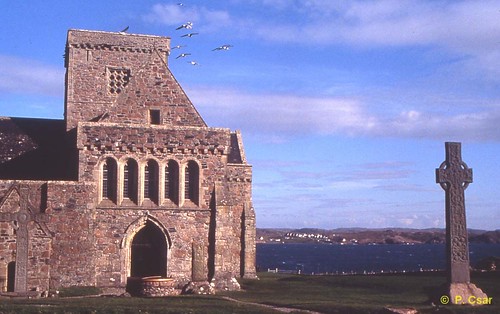
There are some places on earth where the veil between the natural and the supernatural just seems thinner - places that you can just sense are "holy" sites, where you feel the presence of God more keenly. Sometimes you can expect it, as when you're at some place of striking beauty and majesty (Yosemite, the Alps) or somewhere with a rich spiritual history (Jerusalem, Sinai); but sometimes it takes you by surprise, as when you walk into a building and suddenly feel that "God is in this place". NT Wright describes an experience when he walked into an old building for a concert performance not knowing that the building had formerly been a church, and yet he said that as soon as he walked through the door he could sense the spiritual power of the place - the residue of so many years of worship and service to God that had gone on within those walls.
Personally I remember feeling this sense of holy place on the isle of Iona off the coast of Scotland - the site of the first Christian monastery in Scotland from which the Irish monks re-evangelized the whole island of Britain and where a neo-monastic Christian community still resides. There is a sense of spiritual power that just permeates Iona and I remember basking in it as Julie and I wandered around its abbey, its graveyard and its hills and rocks. As one old Scotsman put it, "Iona's a Thin Place - there's not much that separates God and Iona."
I don't think this experience of "Thin Places" is limited to religious people either. Even one of my atheist friends has spoken of how the open plains of the American west could almost lead one to believe in the supernatural. He writes: "...when it gets real quiet on the plains you can almost hear the great, ancient spirits whispering across a thousand generations."
The question for a Christian however is how to explain this. If we believe that all of the Creation belongs to God, and that God is immanent and omnipresent - he is everywhere - then how can we say that there are special places where God is "more" present? Surely God isn't less present here in Yorkville, Illinois than he is on Iona... so why does God's presence seem more tangible on Iona? I mean, in the Old Testament the people of God used to have certain holy places where God's shekinah glory would rest - the tabernacle, the Temple, on the mountain - but in the New Testament Jesus does away with this, saying that now God's people would worship him not in a special place, but in "spirit and in truth" - in other words, anywhere.
And yet we still have these experiences of Thin Places that need to be accounted for. It is tempting to believe that God is indeed in those places in some extra way, and that therefore we should use such places as retreats from the mundane world. We can start to think that "these places are holy and other places are not". However, NT Wright suggests that these Thin Places, rather than being spots where God's presence exclusively rests, are actually signs and pointers to the eschatological reality that one day all places will be permeated with God's presence in the same way, but even more so. Thin Places in our world today, are thus beachheads of God's coming kingdom, and as such they should remind us that in fact all places are potentially holy. In the same way that the sacramental bread and wine reminds us that all physical things have spiritual significance, so too, Thin Places, Holy places, remind us that, really, all places are filled with God's glory, since this is, after all, "my Father's world".
So we are not to treat Thin Places as retreats, places to escape the "unspiritual" world. Rather, they should inspire us to go out and uncover the spiritual reality that is all around us - to treat all of our world and all of our lives as holy. I know for me, this is a reminder I need constantly - to see the divine in the daily and constantly look for the deeper spiritual significance of ordinary everyday life.
Labels: theology


















































"to see the divine in the daily"
like in our local coffee shop.
that's a good reminder.